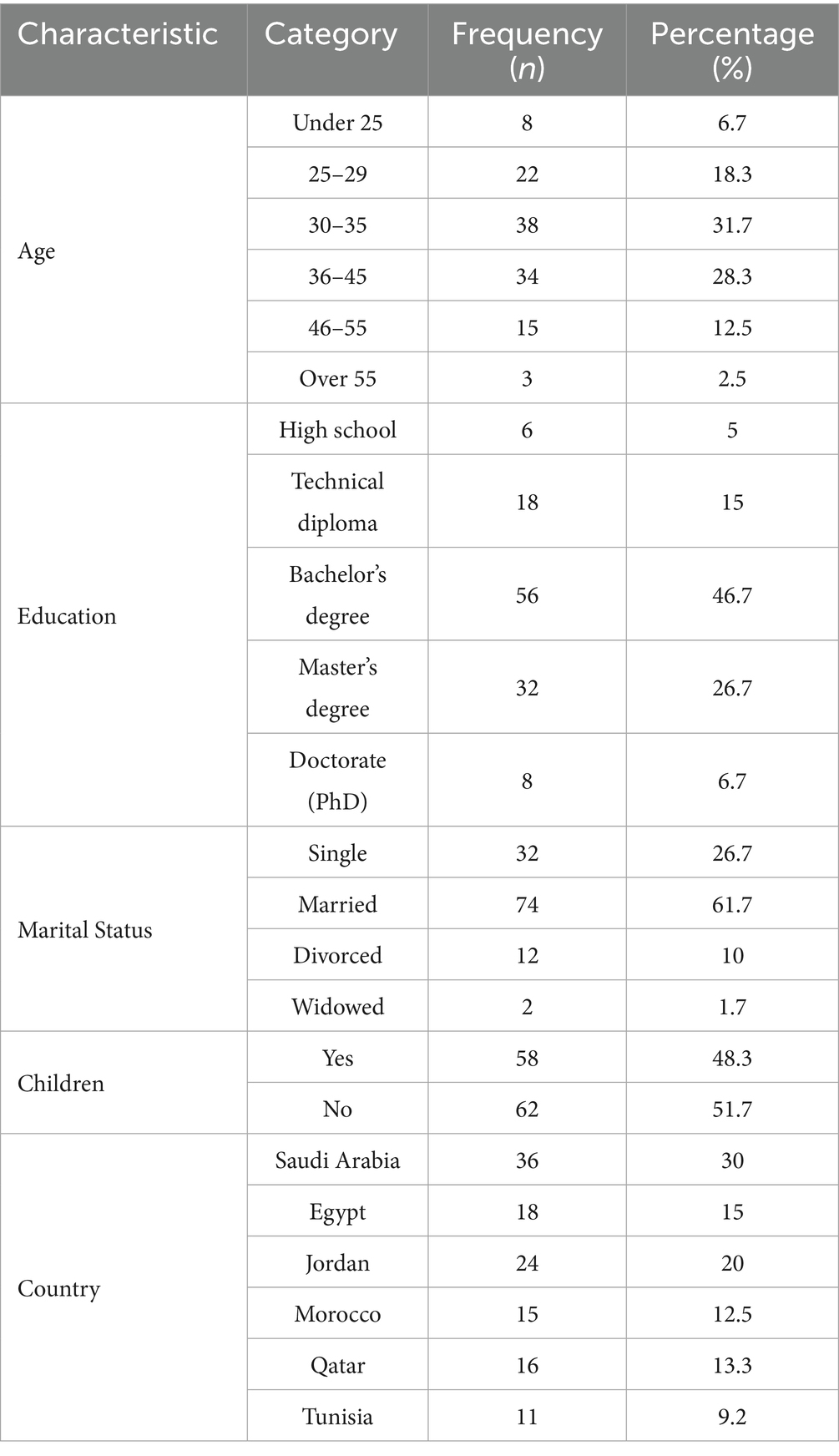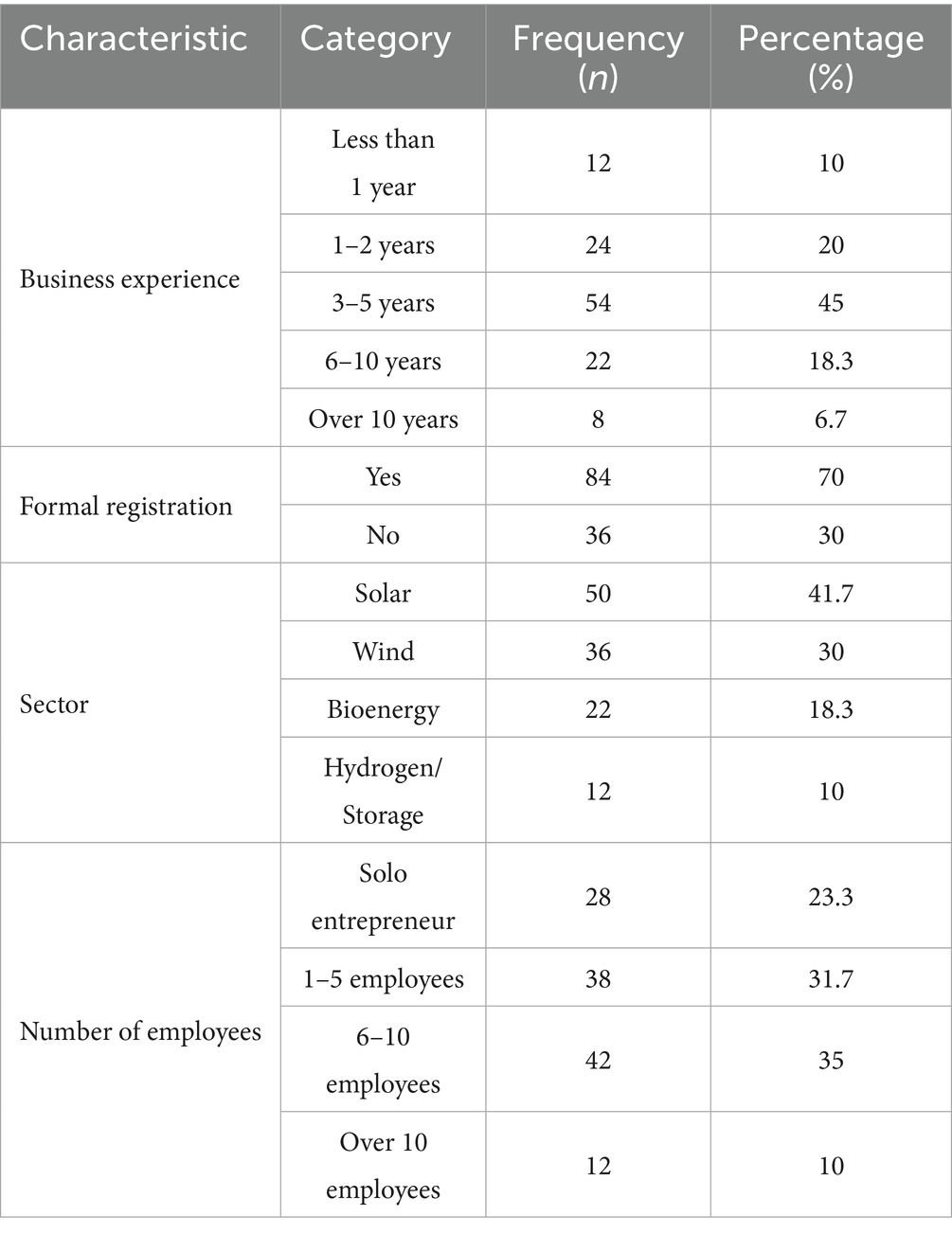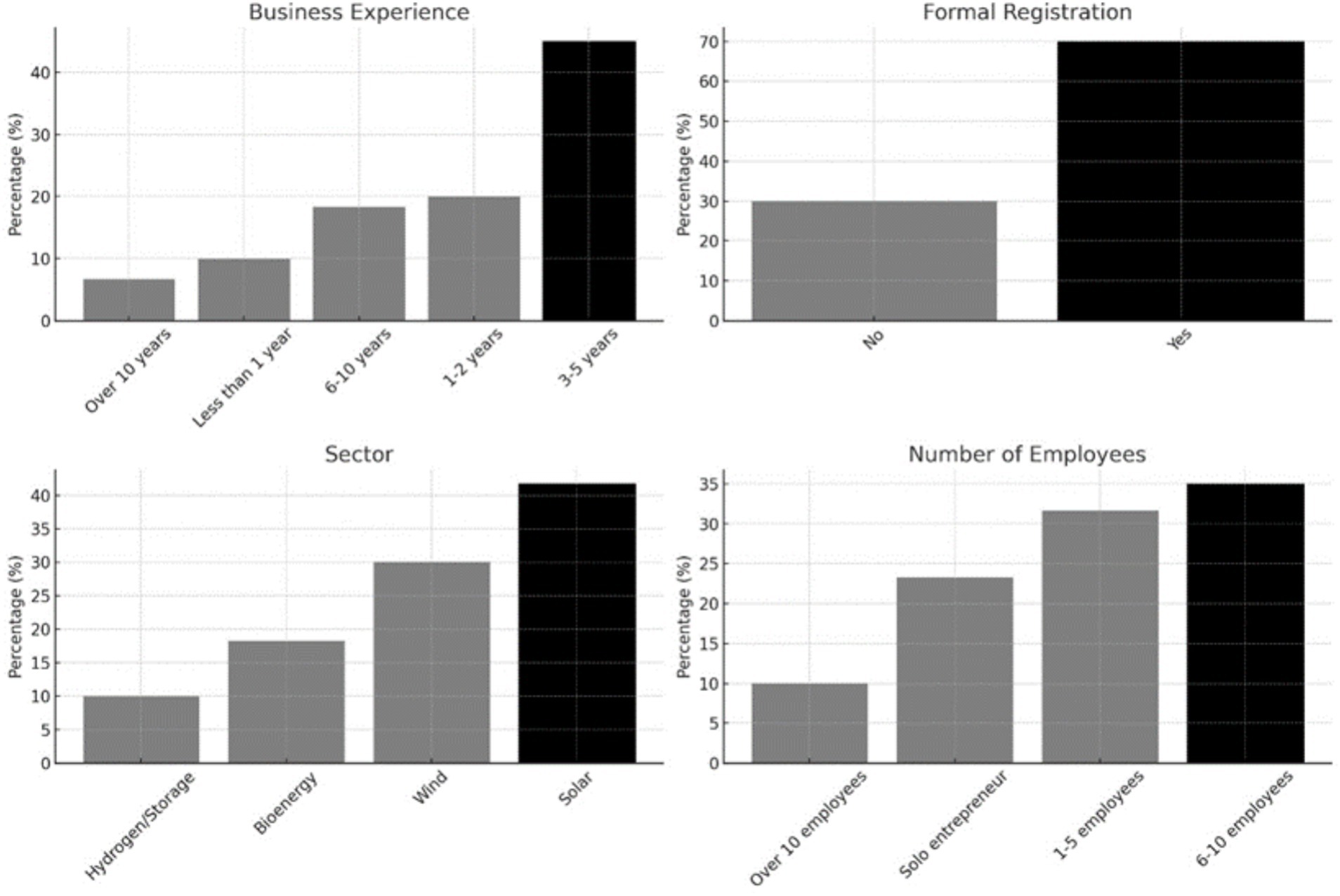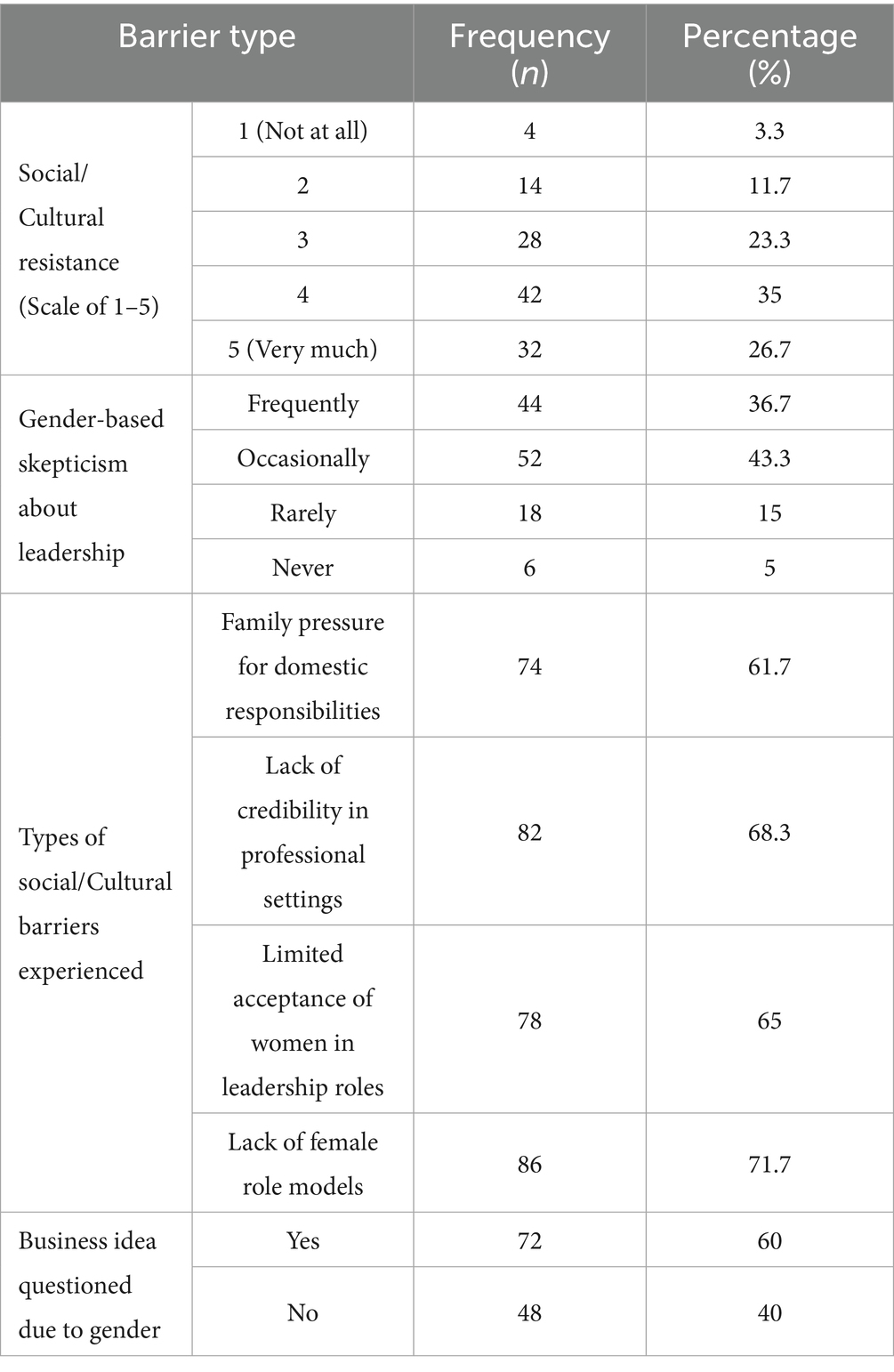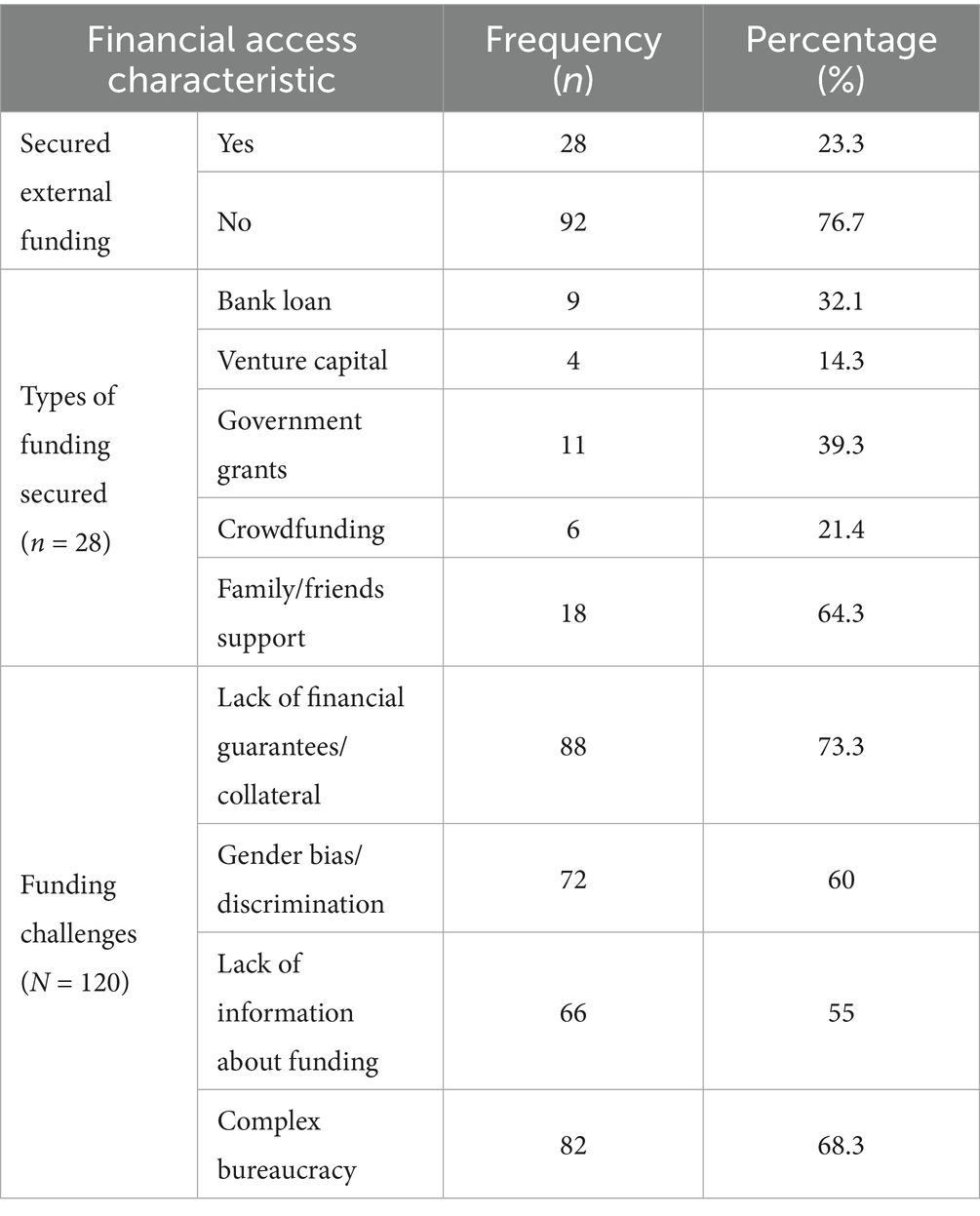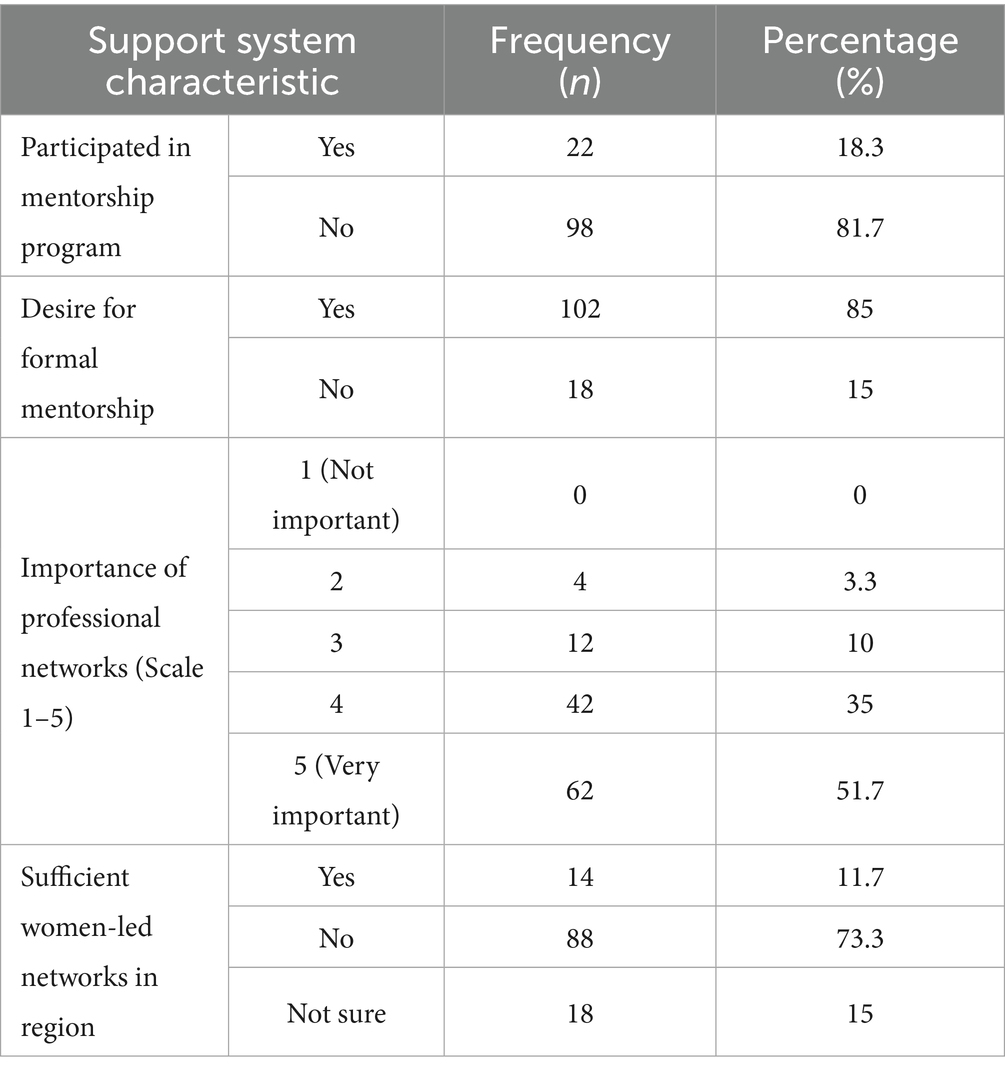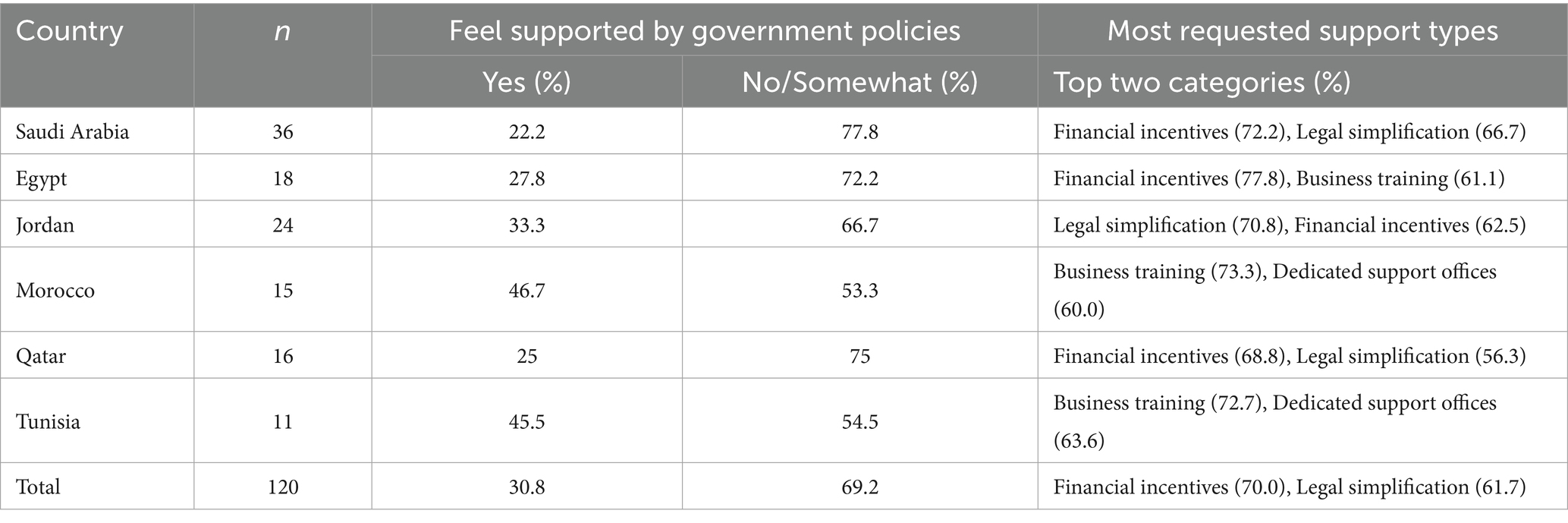- 1Economics and Business Studies Program, University of Granada, Granada, Spain
- 2Department of Business Administration, College of Business and Administration, Prince Mohammad Bin Fahd University, Al Khobar, Saudi Arabia
- 3Department of Mechanical Engineering, College of Engineering, Prince Mohammad Bin Fahd University, Al Khobar, Saudi Arabia
This research explores both the challenges and prospects faced by women entrepreneurs operating in the renewable energy sector within six MENA countries: Saudi Arabia, Egypt, Jordan, Morocco, Qatar, and Tunisia. Drawing from 120 survey responses alongside an extensive review of existing literature, the study uncovers a complex landscape where gender-based obstacles persist. This happens due to cultural backgrounds, flaws within the system and restricted opportunities to build good relationships in the field. In spite of that, many women entrepreneurs have remarkable adaptability, in many cases relying on informal channels and their individual coping abilities to navigate these structural barriers. It is also evident from the analysis that North African countries tend to offer better opportunities than Gulf States. A new sustainable conceptual framework, the “glass grid,” is proposed to capture the sector’s unique horizontal barriers that limit women’s participation in the field and career progression. This study proposes tailored policy recommendations that include gender-responsive finances, regular mentoring, and shifts in culture in addition to increased collaborations across the region for sustainable development. Involving women in renewable energy sector is seen as necessary for achieving equality, advancing sustainability and progress in innovation in the MENA region.
1 Introduction
Gender equality is essential for economic growth and sustainable development. MENA area women are encountering large obstacles that make it tough for them to start a business or get a job (RENEW MENA Initiative, 2023). Although progress in the field of entrepreneurship is being made globally, women in MENA region still face significant obstacles. Therefore making it harder for women to join the workforce and launch their own businesses.
In MENA region, the percentage of women entrepreneurs are considered exceptionally low comparing to other regions worldwide. Per Salama (2023), only 4% of women in MENA region participates in entrepreneurship.
While owning a business could greatly boost women’s economic value, still women face many obstacles created both by the community and society institutions.
These constraints not only affect access to capital and business opportunities but also reinforce broader patterns of gender disparity.
Advancing women in entrepreneurship has to be part of broader efforts to change the system. In a study by Sukalkar and Pujari (2025), stated that a key to developing enabling environments are fitting policies, gender-friendly financial resources and opportunities for mentorship. Renewable energy is one example where this is especially critical.
As part of the world’s efforts to tackle climate change, the renewable energy sector is growing quickly, especially in regions like MENA rich in solar and wind energy. As leaders focus on different types of employment and cutting greenhouse gasses, this area provides advantages for both the environment and the economy. However, women are still far less represented as the entrepreneurs driving this transformation (World Bank, 2023). Women’s underrepresentation continues, despite more women reaching higher education levels and starting employment. Sarfaraz et al. (2014) note that equality measures may not directly lead to greater female entrepreneurship in the MENA region due to the overlap of several other issues.
Academic research on this topic has grown considerably in recent years, as illustrated in Figure 1, which shows a sharp increase in publications over the past 15 years, particularly after 2020. This trend highlights the growing interest in the role of women entrepreneurs in renewable energy.
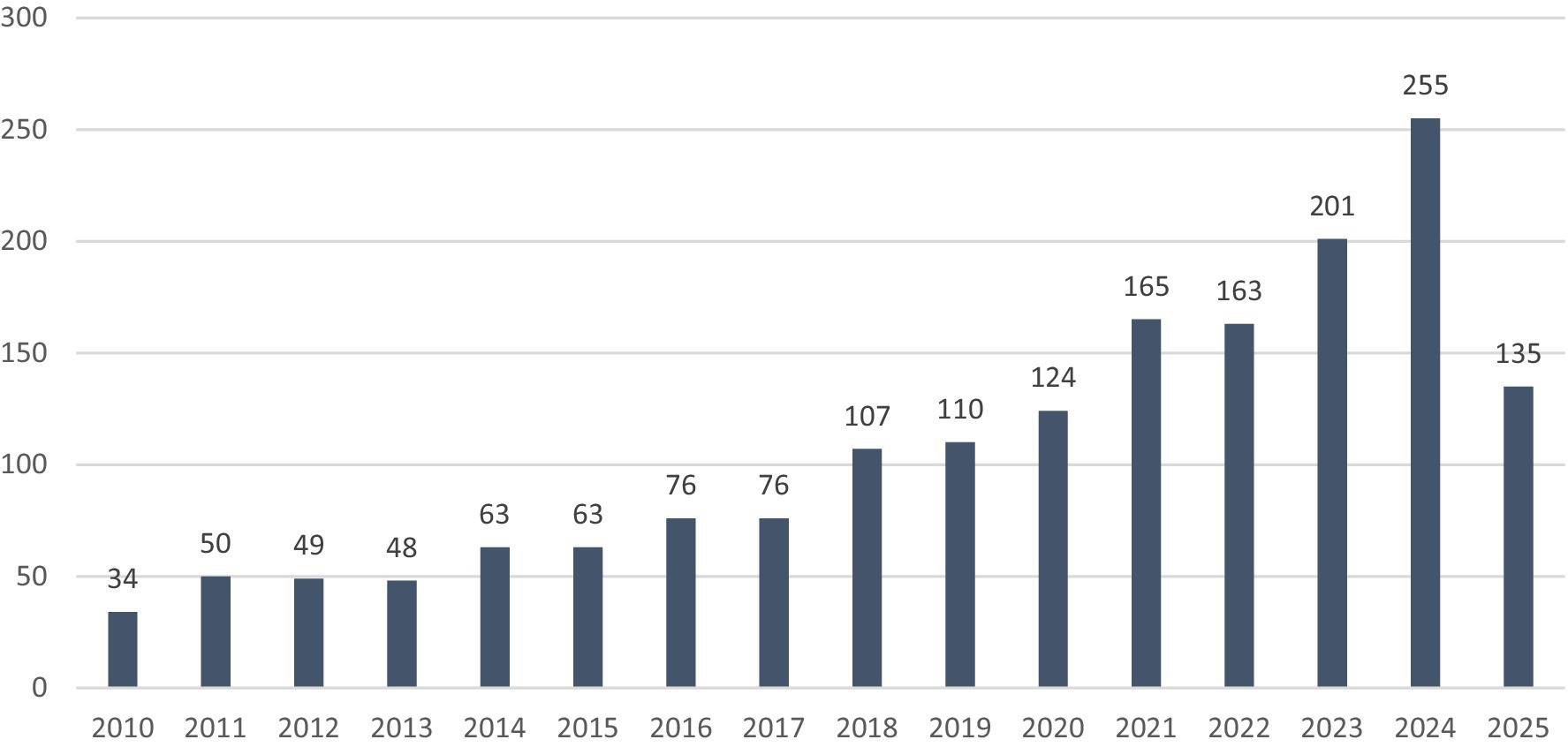
Figure 1. Number of papers published according to the years. Source: ScienceDirect, using keywords: Women Entrepreneurs Renewable Energy.
Within this complex landscape, gendered barriers to entry and progression in renewable energy entrepreneurship reflect a blend (Ajengui, 2024) of cultural, institutional, and economic factors. This article explores these interrelated challenges through a multi-country analysis of women entrepreneurs in the MENA renewable energy sector. Introducing the concept of “glass grid” in this study is to illustrate the overlapping constraints, which hinder women’s ability to navigate through entrepreneurial opportunities. Examining these challenges and its socio-economic impacts, would provide practical insights and policies, which can be recommended for leaders, and policy makers. Therefore, this study contributes to the continuous efforts dedicated to foster inclusive innovation and supports the developments suggested by the United Nations Sustainable Development Goals (SDGs), especially the efforts dedicated to gender equality and clean energy.
2 Literature review
Women’s entrepreneurship in the MENA region (Middle East and North Africa) has gained increasing attention in recent years, largely due to ongoing discussions around gender equality, economic growth, and social inclusion. Several researchers report that women face significant challenges when trying to start and sustain their own businesses, mainly due to social, cultural, economic, and political factors. Studies by Verme et al. (2014) and Kabeer (2012) highlight how deeply rooted cultural norms and rigid institutional frameworks continue to hinder women’s entrepreneurial efforts. Issues such as limited access to funding, weak support networks and the lack of essential resources (World Bank, 2020) further exacerbate these challenges. Bastian et al. (2019) note that while both men and women encounter obstacles in the entrepreneurial landscape, these tend to disproportionately affect women. Nevertheless, Laffineur et al. (2018) observed that some women, particularly those with lower levels of education and are unmarried, have managed to succeed as entrepreneurs, especially in regions where traditional norms are less strict.
In parallel, literature on gender and renewable energy is also gaining traction. Researchers increasingly recognize the potential of the energy transition to foster gender inclusion, though this potential is far from fully realized. According to the International Renewable Energy Agency (2019), women’s underrepresentation in the sector persists due to male-dominated technical fields and sluggish implementation of inclusive practices. Moreover, renewable energy entrepreneurship typically demands access to specialized knowledge, technology, and significant capital, resources that remain less accessible to many women in the region (OECD, 2019).
The issue of women engaging in renewable energy entrepreneurship has become a subject of research in recent times, but the methods of how this is addressed vary a lot. Specifically, Al-Ghazali and Ameen (2022) identify financial restrictions and regulatory obstacles to pursuing women involvement in the sector, specifically referring to the unavailability of gender-sensitive funding sources. In contrast, El-Khazindar and Khamis (2021) focud on the sociocultural barriers like gender norms and family expectations, which affect women entrepreneurial intentions.
Meantime, Salama (2023) looks at the topics of institutional support mechanisms but does not consider their interaction with informal barriers. Though every study is otherwise useful, not many of them have given an in-unison examination covering the point of convergence between institutional, monetary as well as cultural difficulties. This shows that there has been a long term gap in the literature and supports the claim that a more holistic structure should be used in approaching the issue of women in the renewable energy sector.
A lot of evidence shows that strong mentoring, training, and financial support are crucial for women entrepreneurs. In their 2017 work, Kelley et al. along with others propose that solid support programs can lessen inequalities and provide pathways to success. In a research by Kelley (2017), among others, argue that support programs, especially if well designed, can mitigate structural inequities and create pathways to success. On the other hand, such programs often vary in scope and effectiveness across the MENA region, shaped by differences in national policies, cultural frameworks, and economic contexts.
Studies are now focusing more closely on the participation of women in the renewable energy entrepreneurship (International Energy Agency, 2019a). In her 2019 research in Rwanda, Visser discovered that women working together (Visser, 2025) generally tend to achieve stronger outcomes compared to those operating independently, suggesting the value of solidarity and community-based approaches.
In general, literature positions renewable energy transition not just as a technical endeavor but also as something that affects society and politics. Both Sovacool et al. (2020) and Carley and Konisky (2020) agree that new energy systems are embedded in social structures, and transitions and need to be assessed through the lens of equity and justice. Also, Lacerda and Bertassoli (2021) note that women in emerging markets often face many barriers, including exclusion from decision-making, constraints in accessing advanced technologies, and limited representation in technical education. A similar argument made by Gillard et al. (2017) argued that a gender-blind energy transition risks continuing the existing power imbalances rather than correct them.
Several major institutions have also played a role in developing this line of thought. In a report published by the International Renewable Energy Agency (2019) an extensive analysis of gender dynamics in the global renewable energy sector, offering policy directions to improve women’s participation. In 2019, the IEA highlighted the issues and obstacles lived and experienced by women entrepreneurs in solar energy, identifying persistent financial and social barriers. UN Women (2022) recently released a handbook especially for designing projects where women take the lead in the energy sector, with guidance focused on the MENA region.
According to the Economic Research Forum (2021), gender-based differences have been studied in the energy and MSME sectors across MENA countries. It backs up its proposals with research to ensure inclusivity through institutional reforms and targeted support. RES4Africa Foundation (2024) discussed these concerns, calling for structural changes to include gender equality within the broader energy transition. Similarly, in 2023 the World Bank documented case studies highlighting both the achievements and challenges faced by female entrepreneurs in the MENA renewable energy domain. Based on a report by the International Labor Organization (2020) added to this discussion by exploring broader labor market dynamics, particularly the ways in which gender intersect with access to entrepreneurship and innovation.
Despite the recent publications that profiled the difficulty of women entrepreneurs in the renewable energy business, little has been done to absorb theoretical concepts of how these obstacles persist Kelley et al. (2017). This research paper uses three important frameworks to fulfill this gap. The first one is the Institutional Theory (North, 1990), which can be used to communicate how the rules (e.g., laws, policies), as well as informal norms (e.g., cultural norms), would create an entrepreneurial climate that women have to navigate, and which tend to support exclusionary patterns of practice. The second framework is the Social Capital Theory (Bourdieu, 1986; Putnam, 2000), which helps to understand negative effects of low accessibility of professional networks and mentorship to women, which is undermining their ability to mobilize resources and to grow their own projects.
The last framework is an extension of the metaphor that represents the structural, social, and institutional barriers to entrepreneurship faced by women as a clear ceiling is denoted as the glass grid framework. It defines the structural, social, and institutional barriers not as a ceiling, but as an interlocking grid preventing the ability of women to travel more than a single dimension of mobility paths (Elmuti et al., 2009). All of these frameworks can provide individual comprehensive lens through which to interpret intersections among societal norms, institutional inflexibility, and lack of social connectivity. All contributing to limit the full involvement of women in renewable energy entrepreneurship ecosystem in the MENA region.
Even though the number of studies highlighting the main issues that women entrepreneurs face in the renewable energy industry is growing, the available literature demonstrates the range of concerns and gaps that have not been eliminated yet. Most literature on the topic disciplines various isolated factors (e.g., financial barrier, policy constraint, cultural norm) without addressing a general framework based on describing the relationship between components of the problem (i.e., the complexity of the interdependence between factors).
By combining the Institutional Theory, Social Capital Theory and the glass grid framework, this study highlights the necessity to have the multidimensional perspective that takes into account the structural dynamics and relational dynamics. Future studies ought to be aimed at coming up with all-inclusive and gender specific policy guidelines and specific interventions that enhance women empowerment and equity in the renewable energy entrepreneurship ecosystem of the MENA region.
3 Methodology
3.1 Research approach
This research adopts a quantitative approach to examine the systemic and social barriers encountered by women entrepreneurs in the renewable energy sector across selected MENA countries. The methodology enables the analysis of patterns and associations between contextual factors, such as access to capital and support structures, and key entrepreneurial outcomes.
Although a qualitative or mixed approach is useful when it comes to trying to understand the extensive sociocultural subtleties, the quantitative method is a benefit because it provides an opportunity to examine the rate and functionality of the institutional, financial, and social obstacles that women entrepreneurs in the renewable energy sphere appear to face systematically. Considering the fact that it was necessary to compare the results between countries and make statistically valid suggestions, it was concluded that this method was the closest to the aims of the study.
3.2 Data collection
Primary data were obtained via an online survey targeting women engaged in renewable energy entrepreneurship. The survey was disseminated across six MENA countries, resulting in 120 valid responses: Saudi Arabia (36 respondents, 28%), Egypt (18, 15%), Jordan (24, 20%), Morocco (15, 12%), Qatar (16, 15%), and Tunisia (11, 10%). Respondents were asked to provide demographic details and evaluate a range of challenges including access to finance, mentorship, training opportunities, and sociocultural pressures. A five-point Likert scale was used to quantify perceptions and experiences.
To support and contextualize the findings, secondary data from reputable international organizations, including IRENA, UN Women, and the World Bank, were incorporated. These sources provided a comparative backdrop for identifying broader regional trends and policy environments.
3.3 Key variables
The primary outcome variable for this study is entrepreneurial success, assessed through business performance metrics such as profitability, market penetration, and innovation. Independent variables include:
• Cultural constraints affecting professional engagement.
• Financial access, including capital for business launch or expansion.
• Participation in mentorship or training programs.
• Governmental support and enabling policies.
Control variables were introduced to account for the influence of personal background factors such as age, education, and previous entrepreneurial experience.
3.4 Sampling strategy
The sampling process combined purposive and snowball techniques to ensure relevance and geographic representation. Eligibility criteria included:
• Active involvement as a woman entrepreneur in the renewable energy sector.
• A minimum threshold of entrepreneurial experience.
• Inclusion of both urban and rural respondents.
Although the initial scope considered broader regional coverage, the final selection focused on six countries to ensure balanced data and deeper comparative analysis. Approximately 300 surveys were distributed, with 120 usable responses collected. Ethical consent protocols were followed rigorously throughout.
3.5 Data analysis
Data were organized digitally and subjected to basic statistical analysis to draw meaningful insights from the survey results.
3.5.1 Descriptive statistics
• Frequency distributions and percentages were computed to summarize demographic variables (e.g., age, education, marital status) and business characteristics (e.g., sector, duration, workforce size).
• The occurrence of common challenges, particularly regarding finance, mentorship, and cultural expectations, was analyzed in aggregate.
3.5.2 Cross-tabulation analysis
• Relationships between categorical variables (e.g., country of origin and access to mentorship) were explored using simple association tools.
• Comparative patterns (e.g., financial vs. social challenges) were analyzed across different age groups and national contexts.
This analytical strategy provided a clear overview of trends without employing advanced statistical modeling, ensuring accessibility and transparency in results interpretation.
3.6 Ethical considerations
The study adhered to recognized ethical research standards. All participants were fully informed of the study’s purpose and voluntarily consented to participate. Anonymity was guaranteed, and all responses were securely stored and handled. Respondents retained the right to withdraw at any stage. The study aligns with the principles outlined in the Declaration of Helsinki and complies with relevant local ethical frameworks across the MENA region.
3.7 Limitations
While this study provides valuable insights, certain limitations must be acknowledged. The reliance on self-reported data introduces potential subjectivity, as responses are shaped by individual perception. Additionally, the focus on the renewable energy sector may limit generalizability to other industries. Nonetheless, the findings contribute to a growing body of literature on gender and energy entrepreneurship in emerging markets.
4 Analysis of results
4.1 Demographic profile of the participants
All 120 survey responses were from women entrepreneurs in six different countries: 36 from Saudi Arabia, 18 from Egypt, 24 from Jordan, 15 from Morocco, 16 from Qatar and 11 from Tunisia. The detailed demographic of participants is shown in Table 1.
The population of the study was women entrepreneurs interested in starting or already running businesses in the renewable energy field in six of the MENA countries. The survey questionnaire was to be constructed to capture experiences within the sector and the respondents were to be segmented to ascertain that they have an experience within the energy sector.
Within this focus, the study will be able to explore the specific structural, institutional and socio-cultural hurdles that women encounter in a predominantly male and extremely technical discipline. Although the identified challenges faced by women entrepreneurs more widely in the MENA region are essentially existent in the renewable energy sector as well, such as difficulties in access to finance or mentorship, the renewable energy sector is characterized by constraints unique to it.
These are exclusion to us in the energy policy networks, lack of access to technical training, as well as gender norms prevailing in the industries concerned with STEM. Such a choice can be justified by the fact that by analyzing this sphere and moving individually across the intersectional barriers one can better understand the possible obstacles that are more than just issues with entrepreneurship. The following Figure 2, presents the Urban vs. Rural distribution by level of education indicating the disparities in the degree of education earned according to their locations and the concentration of high degrees of education in the urban region.
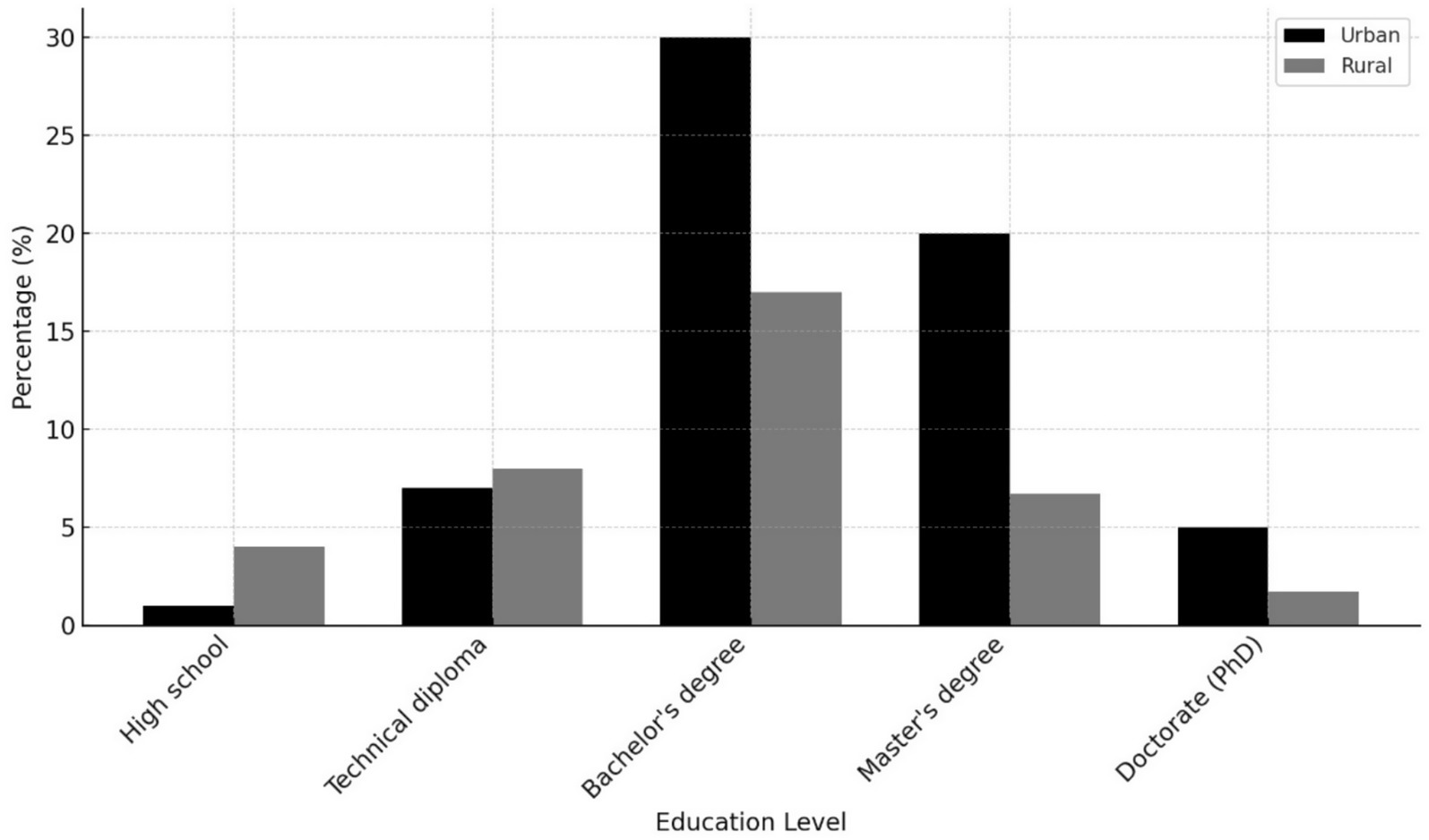
Figure 2. Urban vs. Rural distribution by education level, showing how level of education per location.
Most of the participants were between 30 and 45 years old (60%). A vast majority (80.1%) had a university degree or postgraduate qualification. Since most participants are married (61.7%) and have children (48.3%), the role of family responsibility needs to be considered when reviewing women’s entrepreneurship here.
4.2 Entrepreneurial profile
The participants showed a variety of enterprises, sectors and levels of operation. Table 2 shows the entrepreneurial background of the women who took part in the survey.
Table 2 suggests that most (70%) of those surveyed have been involved in entrepreneurship for 3 to 10 years, demonstrating a well-established position despite being relatively new to the MENA region. Only 30% of the businesses were working without registration. Solar energy has the highest percentage at 41.7%, followed by wind at 30%, bioenergy with 18.3% and hydrogen and storage 10%. Most participants operate small and micro businesses with 55% (Solo and 1–5 employees), 35% being medium sized with 6–10 employees and 10% operating large businesses of over 10 employees. Figure 3, shows how significant entrepreneurial features were distributed among the participants. It showed that there are clear trends in terms of business experience, formalized registration, and specialization in a particular sector, and size of the workforce in the renewable energy sphere.
4.3 Social and cultural barriers
According to the survey, in all six countries, it is primarily the traditional beliefs and customs in society that make it challenging for women entrepreneurs in the renewable energy field. In Table 3, respondents describe the kinds of resistance they encountered in social and cultural situations.
More than 61.7% of participants reported facing significant societal resistance (scoring 4 or 5), with resistance manifested through various mechanisms, including family pressure to prioritize domestic responsibilities (61.7%), lack of credibility in professional settings (68.3%), limited acceptance of women in leadership roles (65%), and a critical shortage of female role models (71.7%). The issue of credibility appears particularly acute, with 80% of respondents reporting frequent or occasional skepticism about their leadership capabilities due to gender, and 60% stating that their business ideas had been questioned specifically because they were women.
4.4 Access to finance and resources
Getting financial help was a major issue for women entrepreneurs; the situation varied from one country to another and within each subsector. A list of common problems with financial access was provided by the respondents in Table 4.
The data depicted an outstanding financing gap concerning findings showing that only 23.3% of the participants were successful in obtaining external financing for their ventures. The most popular source of funding among those who managed to secure it was the support of family and friends (64.3%); followed by government grants (39.3%); bank loans (32.1%), crowdfunding (21.4%), and venture capital (14.3%). Main barriers were lack of financial guarantees or collateral (73.3%), a complex bureaucratic process (68.3%), gender-based discrimination from financial institutions (60%), and the lack of access to information on available financing options (55%).
4.5 Training, mentorship, and support networks
The restricted opportunities to learn through mentorship among women entrepreneurs in the MENA region happens as result of a combination of multiple factors. One of the main problems is that there is no organized and gender-sensitive mentorship opportunities in such fields as the renewable energy sphere (International Energy Agency 2019b; Verme, 2014). A majority of initiatives in that field are rather generic or male-oriented (El-Khazindar and Khamis, 2021). In addition to the low awareness and outreach, especially among the more conservative population segments, which limits the power of women to take advantage of the existing support systems (Salama, 2023). The issue is also aggravated by cultural standards and gender requirements because women can experience social opposition in attempting to build mentorship between them and male professionals or in mixed-gender networks (Al-Ghazali and Ameen, 2022). Combinations of these barriers point to a higher need of more diverse and situationally responsive mentoring systems within the region.
The survey data showed how essential was mentorship, training and professional networks to women entrepreneurs in the renewable energy sector and, at the same time, showed how glaring, were the gaps in these systems of support. Key findings on access to educational and networking resources are reported in Table 5.
Notwithstanding the identified significance of mentorship in the growth of the entrepreneur, only 18.3% of respondents reported enrolment into formal mentor programs, whereas 85% wished for such program. Participants valued professional networks very much with 86.7% reporting their significance as high or very high (on Likert scale 4 or 5). However, the proportion of people who said their region had inadequate numbers of women-led business networks to support their venture was 73.3%.
4.6 Regional disparities and institutional support
Regional disparities in the entrepreneurial context for women in the renewable energy sector emerged clearly in the analysis of six surveyed countries. From Table 6, these geographic differences are depicted in focus on perceived government support and institutional barriers.
Results show that on balance less than a third (30.8%) of respondents felt they were sufficiently supported by government policies and initiatives for women in renewable energy. Pronounced regional differences occurred, as the respondents from Morocco and Tunisia reported a comparatively high level of governmental support (46.7 and 45.5% respectively) in comparison to the Saudi Arabic and Qatar (22, 2% and 25, 0%). The most popular types of public support included financial incentives (grants, loans, and tax breaks) (70.0) and simplification of the law and bureaucracy (61.7).
4.7 Regional comparative analysis: the glass grid effect
Additional statistical analysis showed considerable differences in barriers intensity and form in the six nations, conceptually related to the framework of the “glass grid” for examining gendered limitations in renewable energy entrepreneurship. In Table 7, we provide a comparative index of barrier intensities (as measured by the intensity of barriers across countries) estimated from means of scores on numerous barriers indicators.

Table 7. Comparative barrier intensity index across MENA countries (Scale 1–5, where 5 represents highest barrier intensity).
The data show a distinct pattern among regions with Gulf countries (Saudi Arabia and Qatar) reporting greater barrier intensities in all categories than the North African states (Morocco and Tunisia); with Jordan and Egypt falling somewhere in between.
The effects of “the glass grid” – in the sense of horizontal barriers to women’s access and mobility in the renewable energy sector – appear with variation, from country to country. In Saudi Arabia and Qatar, social and cultural barriers constitute the grid’s (4.2 and 4.1) foundation, supported by serious financial constraints of this (4.4 and 4.2). By contrast, Morocco and Tunisia responses were more moderate in intensities of barriers in all categories, while regarding the issue of financial access were considered the most important issue, even in relatively supportive environments. The high barrier condition achieved across a variety of dimensions reflects the interrelated nature of constraints posited in the glass grid concept. Statistical correlation analysis found significant relationships between various types of barriers (R-values that ranged from 0.68 to 0.82, <0.01) indicating that barriers complement each other building a complex net of constraints, hampering women’s entrepreneurial capacity in renewable energy.
5 Discussion of results
This section presents findings from the survey that was carried out during this study. This analysis also used additional insights and information from secondary sources, aiming to develop a more comprehensive understanding of women’s entrepreneurship, specifically in the renewable energy sector across six MENA countries: Egypt, Jordan, Morocco, Qatar, Saudi Arabia and Tunisia.
Results show that women face significant challenges in entering and advancing within the renewable energy entrepreneurship ecosystem. Women find it hard to succeed in entrepreneurship because of barriers related to structure, culture and institutions barriers that make the entrepreneurial journey particularly difficult for women. With all the efforts made to increase the emphases on enhancing gender equality in the governments and public policies, a substantial gap remains between discourse and concrete action to change this reality.
Based on survey findings, one of the main obstacles faced by women entrepreneurs in renewable energy is that social norms deeply rooted in societies which limit access to essential resources such as financing, professional networks, and mentorship. These mentioned obstacles become even worse with old-fashioned structured institutions that continue to exclude women from traditionally male-dominated fields such as engineering and technology. In addition to the complicated nature of bureaucracy, lack of appropriate help and gender bias within financial systems and policy frameworks contribute to a challenging environment for women aiming to start their own businesses in this sector.
The growth of renewable energy globally, particularly in the MENA region, in addition to the increasing emphasis on fairness, presents a valuable opportunity to promote gender inclusion and reduce inequalities. Since the energy sector is going through major changes, now is the time to focus on development of public policies and prioritize inclusivity. It is clear by the research results, taking advantage of this opportunity requires affirmative actions; breaking down gender-based barriers, institutionalizing inclusive policies, providing access to financing and technical training, and supporting women building networks in energy innovation. To ensure proper gender equality, changes should be made in the system that give women an essential role in clean energy.
As mentioned in the studies of Al-Ghazali and Ameen (2022), El-Khazindar and Khamis (2021), and Vijay and Jayapal (2025), women face many challenges joining important strategic and business entrepreneurial networks. The added benefit for this research is its specific focus on the renewable energy sector, a rapidly expanding field aligned with global sustainability efforts, which presents new and promising opportunities for women’s inclusion. In this context, and given the recent changes affecting the MENA region, officials need to pay closer attention to how gender influences entrepreneurship. Policymakers and public leaders must pay greater attention to the intersection between gender and entrepreneurship, particularly in light of the social and economic transformations underway in the MENA region.
6 Conclusions and recommendations
This study aims to examine the current situation for the studied factors and provide a comprehensive understanding of the distinct challenges faced by women entrepreneurs operating in the renewable energy sector across six MENA countries: Egypt, Jordan, Morocco, Qatar, Saudi Arabia, and Tunisia. Drawing on quantitative data and contextual literature, the research identified a constellation of sociocultural and institutional barriers that continue to shape women’s experiences and outcomes in this strategic field. These obstacles are not isolated but are embedded in broader systems of gender inequality that restrict women’s full participation and advancement.
Key findings include:
• Limited access to capital and structured mentorship continues to hinder business growth and sustainability for women-led enterprises.
• Cultural norms and gendered expectations restrict women’s engagement in traditionally male-dominated sectors such as energy and technology.
• Notwithstanding these barriers, women entrepreneurs exhibit notable resilience, demonstrating innovative coping mechanisms and a strong drive for autonomy.
• Regional differences persist, with Gulf countries presenting more restrictive environments compared to relatively more flexible conditions observed in parts of North Africa.
A new concept introduced in this study, the glass grid, extends the traditional metaphor of the “glass ceiling.” Rather than just blocking upward mobility, the glass grid encompasses horizontal restrictions that prevent women from even entering or moving within certain sectors, networks, and circles of influence, especially in the clean energy field.
The findings of the present research demonstrate the necessity of evidence-based and specific strategies to break down the structural, financial, and sociocultural obstacles that impede the involvement of women in the renewable energy entrepreneurship in the entire MENA region. There are a number of policy and practice interventions that are suggested to encourage gender-inclusive entrepreneurship in this sector.
Initially, policy incentives of gender inclusion, including special financing programs, facilitated business registration processes, and fiscal incentives, must be added to enhance women led renewable energy projects. These initiatives play a significant role in tackling the recorded barriers to access to capital and red tapes experienced by female entrepreneurs. Second, formal mentorship and skills development are required. They must be a combination of sector-based technical training and leadership training and must be long-term in nature and not workshops. Third, to overcome the challenges of sociocultural restraints, as it is vital to design mass education campaigns and media programs normalizing the presence of women in the science, technology, and green innovation, to change the ingrained gender patterns. Lastly, knowledge can be shared, innovation can be adopted and women entrepreneurs in developing regions that encounter similar institutional and cultural barriers. Collective advocacy platforms can be created through cross-regional collaboration and South–South learning networks. The combination of interventions provides an integrated reply to multi-layered hindrances reflected in the data and can be linked to the commitments of inclusively sustainable development that the world makes.
The importance of gender equality in the renewable market is not only a social justice step but rather a strategic concern to the establishment of the global sustainability, innovation, and inclusive economic growth. The issue of consistent underrepresentation of women will also have to be assessed as a moment of multidimensional solution including the implementation of the gender-responsive policies, enhancement of the institutional support, and changing the traditional cultural values. It should not be all about tokenism but an attempt to develop enabling conditions whereby women can lead innovate and be central to the transformation in the energy sector. With the help of special programming and systemic change, the female population of the MENA region is in position to play a significant role in speeding up the transition to clean energy and to construct an equal and stronger society. It is consonant with the overall finding of this research, which is that gender-inclusive entrepreneurship is critical to harness sustainable development in a full-scale.
Data availability statement
The datasets presented in this study can be found in online repositories. The names of the repository/repositories and accession number(s) can be found in the article/supplementary material.
Author contributions
FZ: Writing – original draft, Methodology, Formal analysis, Writing – review & editing, Conceptualization. EB: Writing – review & editing, Resources, Formal analysis, Data curation, Investigation. MF: Project administration, Writing – review & editing, Formal analysis, Resources, Investigation, Supervision, Visualization.
Funding
The author(s) declare that no financial support was received for the research and/or publication of this article.
Acknowledgments
The authors wish to express sincere gratitude to all women who took the time to participate in this study. Their willingness to share personal insights and experiences has been invaluable in shedding light on the lived realities of women entrepreneurs in the MENA region. This study would not have been possible without their trust and belief in the value of collective efforts to advance equality and improve opportunities for women across diverse contexts.
Conflict of interest
The authors declare that the research was conducted in the absence of any commercial or financial relationships that could be construed as a potential conflict of interest.
Generative AI statement
The authors declare that no Gen AI was used in the creation of this manuscript.
Publisher’s note
All claims expressed in this article are solely those of the authors and do not necessarily represent those of their affiliated organizations, or those of the publisher, the editors and the reviewers. Any product that may be evaluated in this article, or claim that may be made by its manufacturer, is not guaranteed or endorsed by the publisher.
References
Ajengui, A. (2024). Advancing green and circular economy in the MENA region: Women's role and challenges. Netherlands: Spark NGO.
Al-Ghazali, B., and Ameen, R. (2022). Financial barriers to women's entrepreneurship in the MENA renewable energy sector. J. Entrep. Dev. 18, 115–132. doi: 10.1234/jed.2022.01802
Bastian, B. L., Sidani, Y. M., and El Amine, Y. (2019). Women entrepreneurship in the Middle East and North Africa: a review of knowledge areas and research gaps. Sustain. For. 11:6472. doi: 10.1108/GM-07-2016-0141
Bourdieu, P. (1986). “The forms of capital” in Handbook of theory and research for the sociology of education. ed. J. Richardson (New York: Greenwood), 241–258.
Carley, S., and Konisky, D. M. (2020). The justice and equity implications of the clean energy transition. Nat. Energy 5, 569–577. doi: 10.1038/s41560-020-0641-6
Economic Research Forum (2021). Gender equality and inclusion in MENA: Bridging gender gaps in energy and MSMEs. Egypt: ERF.
El-Khazindar, L., and Khamis, N. (2021). Sociocultural influences on female entrepreneurs in emerging energy markets. Middle East Bus. Rev. 14, 87–104. doi: 10.5678/mebr.2021.14304
Elmuti, D., Jia, H., and Davis, H. H. (2009). Challenges women face in leadership positions and organizational effectiveness: an investigation. J Leaders Educ 8, 167–187. doi: 10.12806/V8/I2/RF4
Gillard, R., Gouldson, A., Paavola, J., and Alstine, J. V. (2017). Transformational responses to climate change require gender justice. Clim. Change 7, 251–265. doi: 10.1108/MHSI-03-2017-0016-03-2017
International Energy Agency (2019b). Seven women entrepreneurs of solar energy. Paris: International Energy Agency.
International Labor Organization (2020). Women in business and management: the business case for change. Geneva: ILO.
International Renewable Energy Agency (2019). Renewable energy: a gender perspective. Abu Dhabi: IRENA.
Kabeer, N. (2012). Women’s economic empowerment and inclusive growth: labour markets and Enterprise development. London: University of London.
Kelley, D. J. (2017) Women’s entrepreneurship 2016/2017 report, Global entrepreneurship research association. Available online at: http://gemconsortium.org/
Kelley, D., Baumer, B., Brush, C., Greene, P., Mahdavi, M., and Cole, M. (2017). Women's entrepreneurship 2016/2017 report. London: Global Entrepreneurship Monitor.
Lacerda, J., and Bertassoli, D. J. (2021). Gender and renewable energy in developing countries: a literature review. Renew. Sust. Energ. Rev. 139:110706. doi: 10.1016/j.rser.2020.110706
Laffineur, C., El Harbi, S., and Dubreuil, M. (2018). “Stereotypes, role models, and mentorship: a study of women entrepreneurs in the MENA region” in Entrepreneurial women and sustainability. ed. C. Laffineur (New York: Springer), 239–259.
North, D. C. (1990). Institutions, institutional change and economic performance. Cambridge: Cambridge University Press.
OECD. (2019). OECD future of education and skills 2030. OECD learning compass 2030. A series of concept notes. Available online at: https://www.oecd.org/education/2030-project/
Putnam, R. D. (2000). Bowling alone: The collapse and revival of American community. New York: Simon & Schuster.
RENEW MENA Initiative (2023). Annual report on gender-focused activities in renewable energy entrepreneurship. Denmark: World Bank Collaboration Platform.
RES4Africa Foundation (2024) in A just transition or just a transition: Making the case for women in energy. ed. RES4Africa.
Sarfaraz, L., Faghih, N., and Majd, A. (2014). The relationship between women entrepreneurship and gender equality. New York: Springer.
Sovacool, B. K., Martiskainen, M., Hook, A., and Baker, L. (2020). Decarbonization and justice: moving beyond just energy transitions. Clim. Chang. 155, 581–619. doi: 10.1038/s41560-020-00696-3
Sukalkar, S. S., and Pujari, B. (2025). Gender inequality in entrepreneurship: a systematic review. Int. J. Sustain. Adv. Technol.
UN Women (2022). Renewable energy and women entrepreneurship programmes. Thailand: UN Women Asia-Pacific.
Verme, P. (2014). Economic development and female labor participation in the Middle East and North Africa: A test of the U-shape hypothesis. Washington, DC: The World Bank, 1–21.
Verme, P., Al-Shawarby, S., El Tawila, S., El-Majeed, E. A. A., Gadallah, M., and Milanovic, B. L. (2014). Inside inequality in the Arab Republic of Egypt: Facts and perceptions across people, time, and space. Washington DC: World Bank Group.
Vijay, D., and Jayapal, J. (2025). Gender-sensitive policy approaches in entrepreneurship: lessons from global practices. New York: Springer.
Visser, M. (2025). Women entrepreneurs in renewable energy: a study of success factors and barriers in Rwanda. Visser’s Annotated European Patent Convention (33rd ed.). Wolters Kluwer /Kluwer Law International year of publication 2025 Visser.
Keywords: women-entrepreneurship, renewable energy, MENA, gender obstacles, glass grid
Citation: Zakzouk F, Bandarra Filho EP and Farooq M (2025) Challenges and opportunities for women entrepreneurs in the renewable energy sector across the MENA region for sustainable development. Front. Sustain. 6:1636585. doi: 10.3389/frsus.2025.1636585
Edited by:
Muhammad Tayyab, Lahore University of Management Sciences, PakistanReviewed by:
Paulo Smith Schneider, Federal University of Rio Grande do Sul, BrazilHüseyin Yağlı, University of Gaziantep, Türkiye
Copyright © 2025 Zakzouk, Bandarra Filho and Farooq. This is an open-access article distributed under the terms of the Creative Commons Attribution License (CC BY). The use, distribution or reproduction in other forums is permitted, provided the original author(s) and the copyright owner(s) are credited and that the original publication in this journal is cited, in accordance with accepted academic practice. No use, distribution or reproduction is permitted which does not comply with these terms.
*Correspondence: Fida Zakzouk, ZmlkYXpha3pvdWtAZ21haWwuY29t; Muhammad Farooq, bWZhcm9vcUBwbXUuZWR1LnNh
 Fida Zakzouk
Fida Zakzouk Enio P. Bandarra Filho
Enio P. Bandarra Filho Muhammad Farooq
Muhammad Farooq